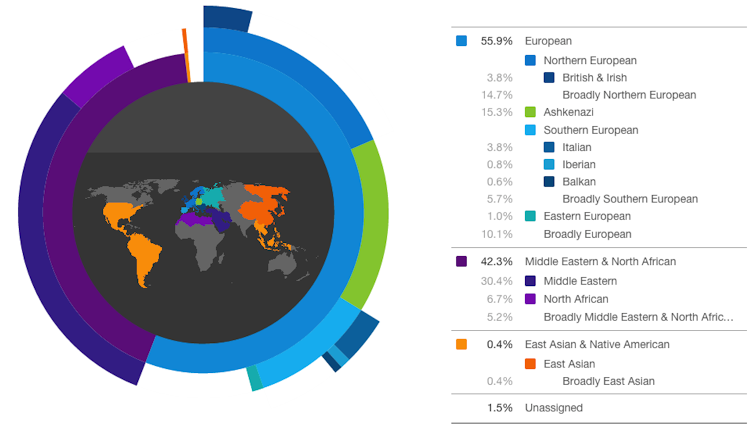
The personalised genetic testing company 23andMe has had its share of supporters and critics. The critic with the most impact has been the US Food and Drug Administration (FDA) who in December 2013 forced the company to cease providing a health advisory service based on the genetic testing. It declared the service as a “medical device” which would require FDA approval, which it did not have.
23andMe has still not succeeded in resuming its health advisory service, but it has continued in the meantime with its genetic testing and offers genetic-based ancestry reports instead. It does offer the raw genetic data from the test however, and this can be used to provide health-related information for those who are still interested in that information.
How does it work?
The 23andMe service is amazingly straightforward. For US $99 and shipping, a plastic vial is sent which is used to collect saliva and return for analysis. All human saliva contains cells and the first step in the analysis is to extract the genetic material from the cells and “amplify” it by creating copies until there is enough to analyse.
23andMe analyse the DNA by using machines containing special “chips”. These chips provide information about specific sections of DNA that are called SNPs (pronounced SNIPS). It turns out that SNPs are inherited and so once identified, they can be used to identify how much you have in common with another person and what population of early humans you are likely to have descended from. The 23andMe service can tell you who on their database you are directly related to and so it is possible to find immediate relations (brothers and sisters) and near and distant cousins. If you have set your profile to be publicly available, you could even get into contact with these relatives.
Exploring your past
A person’s paternal and maternal lineage also can tell you which part of the world your distant ancestors came from and which particular groups you were descended from. The timing of these origins is about 500 years ago, before transportation and migration blended the genetic makeup into a more homogenous mix.
An immediate benefit of having this data is to get a sense of how connected we are to others around the world despite where we happen to be at this point in time. It can also lead to some interesting insights when you discover that you have asian or jewish heritage for example, or both.
Exploring your current and future health
23andMe does not provide a health report based on the composition of a person’s DNA. However, the raw data from the analysis can be downloaded and then submitted to other services such as Promethease. This analyses the SNPs in a profile and then compares it with a database of research that has previously linked a particular SNP with a disease or human characteristic or behaviour.
The SNP called rs7574865(T;T) for example is related to a 2.6 times risk of rheumatoid arthritis; 3.10 times risk of SLE; 2.28 times risk of Sjögren’s syndrome; increased risk of type-1 diabetes; and increased risk of primary biliary cirrhosis.
The pluses and minuses of knowing your genetic code
If that all sounds slightly overwhelming, well it is. And here is one of the problems with what 23andMe are trying to do and why the FDA objected to it. The problem is that knowing this risk means very little at this stage. There is nothing you can do about avoiding something like Rheumatoid Arthritis and knowing that you are at increased risk of getting it is not that helpful. It is like knowing that living in a city increases your risk of schizophrenia compared with rural life.
However, if you have got Rheumatoid Arthritis, knowing that you have certain SNPs could turn out to be critical in determining whether particular drug treatments will actually work. In the case of this disease, for example, a certain class of drugs called anti-TNF alphas work better on people with certain SNPs. The treatment of these types of conditions can be made much more effective and less expensive if you know that something is likely to work or not.
As with all information, it is not having the information that poses the problem, but what you do with it. Having information about yourself puts you in a position to use that information to understand yourself better by understanding your place in the world and how your genes are likely to affect your emotional and physical well-being, and how they interact with your environment. That can only be a good thing.
